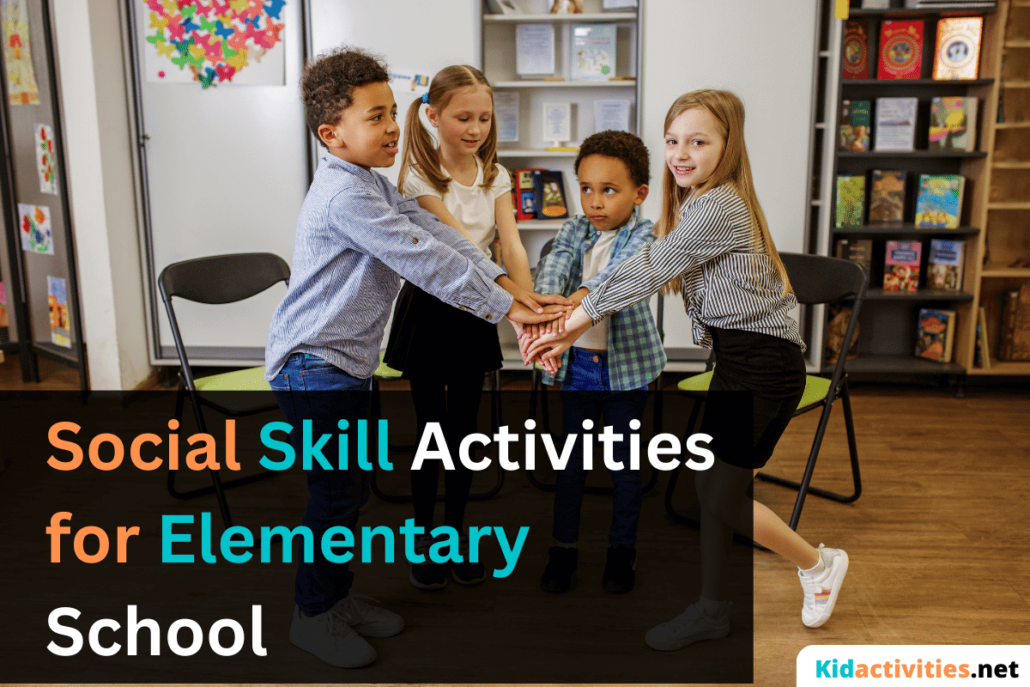Social skills are essential to a child’s development. However, with the recent advancements in technology, kids are spending more and more time using mobile phones and computers or playing video games at home.
This could lead to negative consequences, such as poor social skills and communication problems later on in life.
At home, parents can help their children develop social skills through simple activities that teach them how to deal with different types of people, whether they are family members, friends, or strangers. In school, teachers can address these issues by incorporating social skill lessons and activities into their curriculum.
These lessons should be presented in a fun and engaging manner to motivate children to participate. With a little bit of creativity and planning, you can develop lessons that will positively impact your students.
How to Develop Confidence and Social Skills in Young Children?
If you are looking for ways to encourage kids to become better social beings, here are 32 social skills lessons and activities that you can use to help them:
1. What Makes Me Special?

‘What makes me special?’ is a simple classroom activity that will not only improve children’s social skills but also encourage them to be more positive about themselves.
One by one, you can ask each child about their special characteristics, interests, hobbies, or talents. It’s a great way to celebrate everyone’s uniqueness and build up self-confidence in children.
2. Getting to Know Each Other

This is a classic first day of school activity to break the ice and get the kids acquainted with each other. Arrange the class in groups of four and let the kids interact with their classmates for 10 minutes or so. Then, ask each one of them to share something about their group mates. This activity is easy to implement and is guaranteed to create great first impressions among students.
3. Pick a New Friend

Some kids have trouble making friends. If your students are shy or have difficulty getting to know new people, try this simple activity in your classroom.
First, assign a buddy to each student – making sure that each pair doesn’t know each other well. Next, assign them a simple task, such as reading a book, playing a board game, or doing a science experiment together. These simple interactions will help the kids feel more comfortable communicating and socializing with each other.
4. Compliment a Friend

Kids are naturally motivated by the desire to be liked and appreciated. This activity provides an opportunity for them to notice the good things about people – in general.
`Simply ask your students to find someone in class who’s particularly friendly, kind, or helpful to them. Then ask them to compliment that person. This is a simple but effective way to develop positive peer relationships, which is important for kids’ success in school and in life.
5. Voice Control Activity

Voice modulation is a very important communication skill that kids need to learn at an early age. As you know, it can be quite challenging for young children to control their voice at times.
To teach them how to behave in different social settings, you can ask them to role-play different scenarios, such as when they’re inside the library, at the playground, in the school bus, etc. Not only will this help them understand appropriate social behavior, but it will also serve as a great tool to teach them about the importance of self-control.
6. Guess the Facial Expression

Kids need to learn how to identify different emotions simply by looking at someone’s facial expression. They need to recognize non-verbal cues to help them behave appropriately in different situations.
The best way to teach this skill is to show the kids pictures of people’s faces and ask them to guess what emotion the person is feeling and how they should react when someone is feeling that way.
7. Tell Me a Secret

Secrets, no matter how small, can cause problems if they are told to others. But when you teach kids the importance of keeping their word, they will be less likely to lie or break a promise.
This activity is a great way for young children to learn the value of trust to maintain any kind of relationship. It is also a crucial life skill that will benefit them throughout their lifetime.
8. Charades

Communication isn’t just about spoken words. Non-verbal gestures also add meaning to what we say, so it’s important to help children learn how to interpret those signs as well. Charades, as shallow as it might seem, is one of the best ways to do that.
Not only is it fun, but it’s also a great way to teach kids how to read body language, which helps them better pick up non-verbal signals and communicate more effectively in real life.
9. The Proper Way to Apologize

Nobody wants to accept that they’re wrong but if you want to raise polite and considerate children, teach them that accepting responsibility for their actions and apologizing is part of being a good person.
Instead of just ignoring or deflecting blame, kids should apologize with sincerity, no matter how big or small the mistake. Saying sorry and taking full accountability strengthens relationships, builds trust, and teaches empathy and sympathy for others – skills that will benefit children well beyond childhood.
10. Sing a Song Together

Music is a universal language that everyone understands. For kids, it gives them the opportunity to express themselves creatively, while allowing them to connect with their emotions.
If you are looking for an entertaining way to teach kids how to connect with others and develop their social skills, singing together is a great option. You can assign each student a part of a song and have all of them harmonize on the chorus. It’s a great way to bond, connect, and encourage kids to get along with others.
11. Joke Time
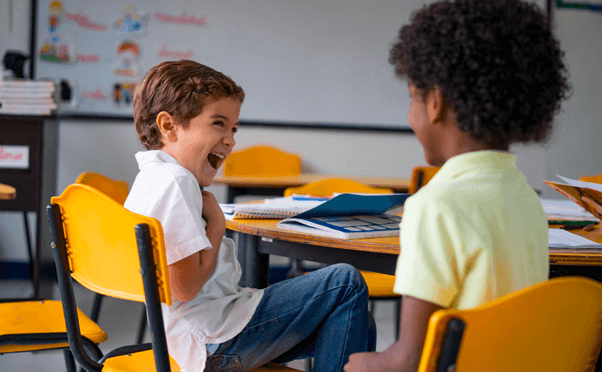
Kids can work on developing their social skills through jokes and humor. By joking around they will feel more relaxed around other kids, which is crucial in making friends. Plus, it’s a great way to lighten up any tense situation in the classroom. At an early age, kids need to take things not too seriously, especially when they’re young. They need to be able to laugh at themselves and realize that life isn’t always serious.
12. Role Playing

Children are naturally curious and inquisitive, but sometimes they may be shy or reserved and they don’t easily open up with others. If that’s the case, role-playing can break down some of those barriers.
You can assign them a specific role or job to perform such as a doctor, police, chef, firefighter, etc. Teach them to think and behave like their character would, and you’ll see the difference in their confidence almost immediately.
13. Simon Says

For this activity, the kids will simply take turns being ‘Simon’ and give simple commands that the others need to follow. Whether it’s to smile, stand straight, jump, or hop, the goal is for them to do whatever Simon says.
This is a simple but effective way to teach kids to follow instructions and listen carefully to what other people are saying. It also develops leadership skills for those who get to be ‘Simon.’
14. Stage Play
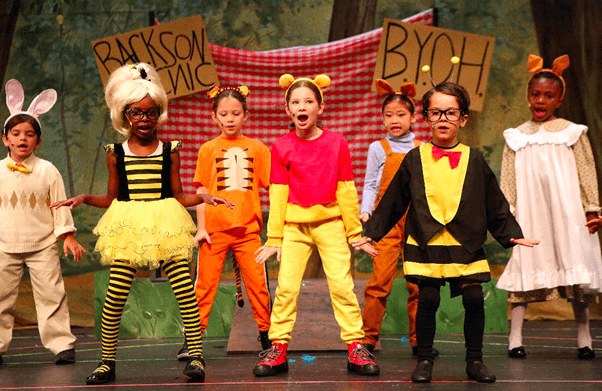
Working together to create an amazing performance takes a lot of passion, teamwork, and discipline. Not only does stage plays provide an amazing outlet for creative expression, they are also a great opportunity for kids to practice a wide range of social skills such as cooperation, communication, patience, and collaboration. Plus, performing in front of a lot of people is the best way to boost a child’s self-esteem.
15. Staring Contest
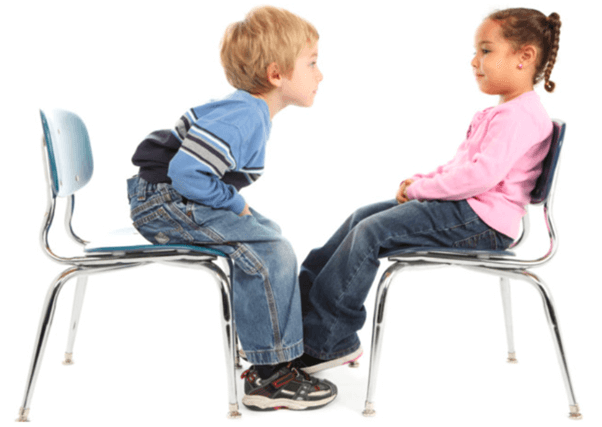
It’s common for kids to be afraid of or intimidated when someone looks directly into their eyes. That’s why it’s important for them to learn how to maintain eye contact.
Not only does it convey sincerity and confidence, it’s also a sign of respect when talking to another person. Staring contests can be an enjoyable and easy way for kids to practice this basic but very important social skill.
16. Giant Jenga
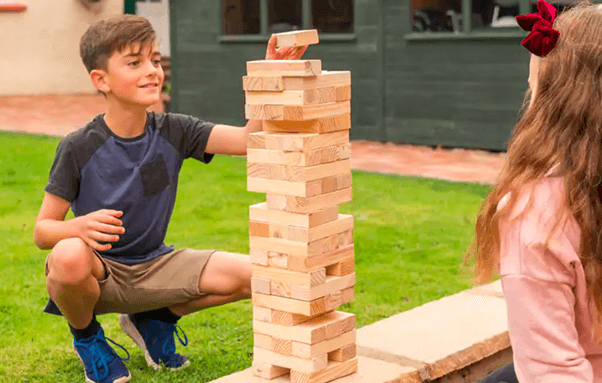
Interactive and strategic games like Jenga provide an excellent opportunity for children to work on different important life skills, including problem-solving, concentration, patience, and coordination.
They also learn to take turns, cooperate, share, and compromise, which are all important things that kids need to learn while they’re still young. If you are looking for a fun and exciting way to encourage children’s social development, playing giant Jenga is the best way to do so.
17. Pen Pals
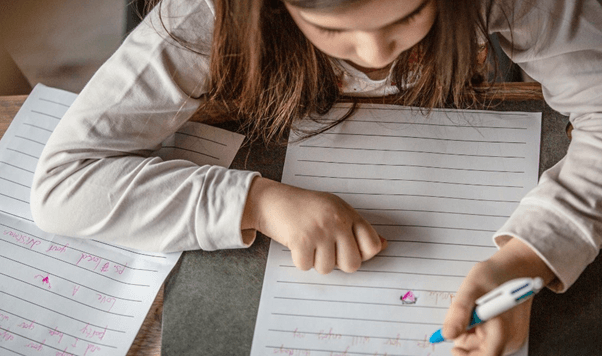
For kids who prefer writing over speaking, sending letters to a pen pal may be a great way to start a friendship and improve their social skills. During the holiday break, parents can ask their kids to write a letter to one of their classmates from school and send it via snail mail.
It’s a fun and inexpensive activity that will not only improve their social skills, but also help them feel more comfortable sharing their thoughts and ideas with others.
18. Community Gardening
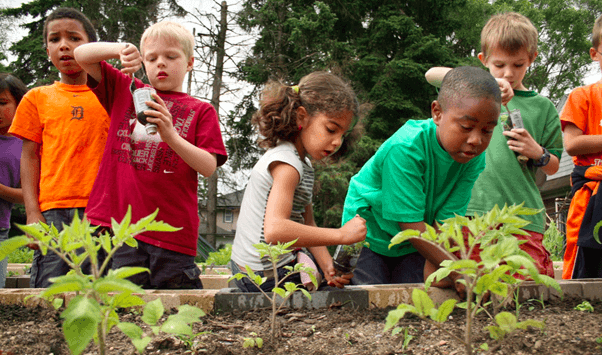
Not only does community gardening promote healthy habits and develop kids’ social skills, but it can be a lot of fun too. In school, this can be a semester-long activity where kids will plant seeds in a shared garden and tend to them until they are ready to be harvested.
Pair up the kids and assign them different vegetables to grow and see how they work and collaborate together in the process.
19. Zoom Meetings
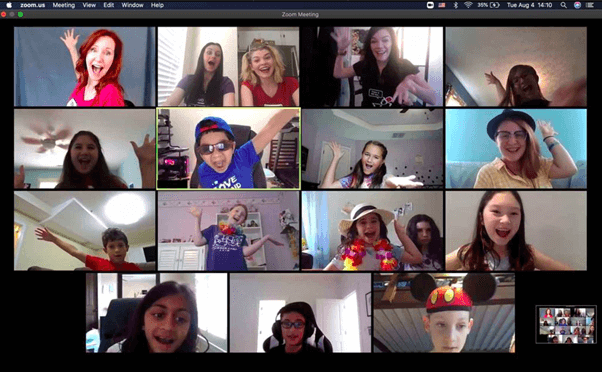
Even though classes have already resumed and schools are now back to normal, Zoom meetings can still provide a way for kids to engage in school-related conversations when they’re at home.
You can use video-conferencing to let the kids discuss homework and conduct study groups after school. This is a great strategy to make screen time more useful and productive, while using technology to create more opportunities for interaction and collaboration.
20. Snack Sharing
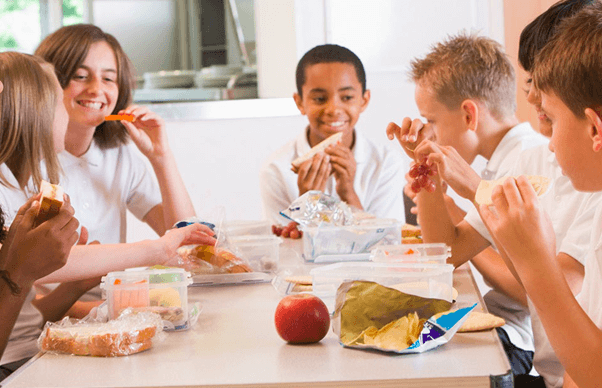
During recess, kids can share their snacks with one another and make sure that no one gets to eat alone. There are a lot of times when the shy ones get excluded from social interactions, but by having a snack sharing activity, kids will be able to get to know each other better and form new friendships.
You can also teach them proper manners by reminding kids not to talk when their mouth is full, saying ‘thank you’ when someone offers them food, and asking for permission before they take another person’s snack.
21. Field Trips

An annual field trip is the perfect way for kids to get out of their comfort zone and explore the big world out there. During field trips, kids are given the opportunity to meet new people and explore new places.
They are often exposed to a variety of stimuli that help them grow intellectually, emotionally, and socially. Whether it’s a trip to the zoo or the local museum, kids will surely enjoy spending time outside with their friends and making new acquaintances.
22. Team Sports

Some of the best lessons kids can learn through sports include teamwork and cooperation. They will learn how to work together towards a common goal while developing valuable skills such as leadership, communication, and conflict resolution. Win or lose, kids who play sports will always leave the court better than when they entered it.
23. Debate

Not only are debate clubs a great way for kids to develop critical thinking skills, they also teach them about the importance of being able to stand up for what you believe in.
The ability to argue your point of view and persuade someone to agree with your opinion is a powerful skill to possess. Kids will likely develop an appreciation for other points of view, which in turn will make them better members of the society when they grow older.
24. Summer Camp

If your child has an interest in a particular sport or subject, consider signing them up for a summer camp that focuses on that area. Summer camps can be an excellent way for children to explore something they’re interested in. It’s also a great place for them to meet a lot of new friends, learn how to be independent, and experience unforgettable memories.
25. Relay Games

Teamwork is one of the most important skills kids should learn, and relay games provide them with countless opportunities to practice the art of cooperation.
Learning how to work with others, follow rules and regulations, and stay focused on what they’re doing at all times are all skills that kids can build as they participate in relay races. Plus, relay races are just plain fun and entertaining.
26. The Telephone Game

To play the ‘telephone game,’ simply group the kids evenly and ask them to form a straight line. Each kid is responsible for telling each person behind them the last thing that was said by the player before them.
The last person on the line will then have to recite everything he or she heard from the previous player. This is a hilarious game to play and a great way to strengthen kids’ memory skills as well.
27. Blindfolded Obstacle Course

Divide the kids into groups of three, one of them will be the ‘caller’ and the other two will be blindfolded. The caller will have to shout and give directions such as ‘go left’, ‘turn right’ or ‘go straight ahead’.
The blindfolded players should follow their caller’s instructions and go wherever they are directed. The fastest team to finish the obstacle course wins the game.
28. Acts of Kindness Calendar

An ‘act of kindness calendar’ is a simple but very effective way to teach kids how to be kind to others. It is a printable calendar where each day has a corresponding act of kindness that you can do for someone else.
According to science, it takes 21 days to build a healthy habit, so a month of doing nice things to other people is more than enough to get kids started on the right foot.
29. Express Yourself Board Game

A board game called ‘Express Yourself’ is a great way to encourage kids to share their thoughts and feelings. The board consists of different categories, from picking a card, losing a turn, acting a certain emotion, etc.
On the cards, there are plenty of questions and social situations that kids need to answer or act out. It’s an effective way to teach kids how to deal with their emotions and behave in real-life scenarios.
30. Play Dates

An hour or two of play date per week can do wonders for the physical, emotional, and social well-being of young children. Instead of playing video games and watching TV all day during the weekends, why not invite some of your kid’s friends to play some board games, do arts and crafts, or share a simple family meal together? Play dates are fun and productive, and they also create strong bonds between children.
31. Chores

As early as possible, kids need to learn how to take care of things and you can do this by assigning them some household chores. While these chores don’t have to be huge, small tasks like cleaning up their toys after a long day of play or helping their younger siblings to wash the dishes or fix the bed will help children develop self-discipline and work ethic at an early age.
32. Taking Turns

For younger kids, knowing how to wait for their turn can be a real challenge. However, if you fail to teach them the value of patience at an early age, it will be more difficult to control their tantrums as time goes by.
That’s why it’s important to start practicing this basic behavior as early as possible. You can do this by setting clear boundaries, such as waiting for someone’s turn to play with a toy or do something, before giving in to their demands.
Nurture Socially Aware and Responsible Kids
Socialization is a crucial part of child development. While parents cannot control all aspects of their children’s social lives, teachers can help set the stage for healthy social interactions in school by ensuring that the kids have ample opportunities to communicate and interact with each other.
Through these activities, parents and educators can encourage socially conscious, respectful, and responsible behavior in children.
We hope that the above-listed activities inspire you to get creative and develop new ways to teach your kids or students to be compassionate, loving, and kind. With your guidance, they will grow into wonderful adults who will make a positive impact on our society, now and in the future.
